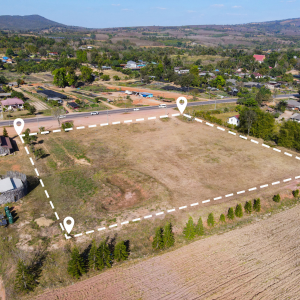
Understanding Land Value: Key Factors for Texas Property Owners
Selling your land parcel will benefit a Texas real estate developer who would be interested in acquiring it and amplifying its valuation. The value of a land parcel fundamentally transforms with its location, zoning classification, parcel size, and the prevailing industrial market, and these same factors matter when you choose to Sell Land to the City or County as well.
Proximity to urban cities or up-and-coming areas can significantly improve the interest your property garners from real estate investors. In addition, understanding the zoning laws in the area is just as important, as these laws dictate what can be done to a property, significantly affecting its value.
Favorable zoning for commercial or residential projects also increases the price of land. Infrastructure also plays an equally critical role; properties with water access, electricity, and transport systems attract developers willing to construct at lower costs.
Market demand also plays a significant role; in high-demand areas like Austin or Dallas-Fort Worth, land prices tend to be competitive due to intense interest from builders and investors eager to capitalize on growth trends. Considering the factors above, Texas landowners can enhance the value of their property and improve positioning in contractual dealings relative to land negotiations with developers.
Texas Real Estate Market for Land Sales
Understanding the Texas real estate market is essential for attracting developers to your land sales. Whether you’re developing a residential, commercial, or mixed-use project, Texas presents a unique combination of opportunities for every kind of developer.
The state’s rapidly growing population and strong job market create a highly demanded, development-friendly environment. Due to their newly emerging opportunities, infrastructure, and technology-friendly regions, cities like Austin, Dallas-Fort Worth, San Antonio, and Houston are beautiful hotspots.
The vibrant market is appealing for investment due to Texas’s relatively lower taxes and business-friendly regulations, attracting many developers. Understanding the local zoning regulations, following the region’s economic shifts, and knowing the developing areas can help market a property more effectively.
Building a network with nearby realtors and using research and analytical data on real estate trends can render your land a remarkable development prospect within the ever-growing Texas real estate market. We Buy Land Quick can help by providing the insights and connections you need to succeed.
How Do You Sell Your Land to a Developer?
Selling your land to a developer in Texas involves several strategic steps:
- Research Zoning Laws and Market Trends
– Understand local zoning regulations and current development trends to align your land with developers’ needs. - Obtain a Land Survey and Appraisal
– Provide a precise and professional evaluation of your property’s size, boundaries, and value to instill confidence in potential buyers. - Market Strategically to Developers
– List your land on platforms frequented by developers and connect with real estate professionals specializing in land sales. - Master the Art of Negotiation
– Be ready to discuss pricing, timelines, and potential creative deal structures, such as seller financing or joint ventures. - Understand the Developer’s Due Diligence Process
– Familiarize yourself with common steps developers take, such as environmental assessments, feasibility studies, and title checks, so you’re prepared for their questions and requirements. - Consult a Texas Real Estate Attorney
– Work with a lawyer experienced in Texas land transactions to ensure all legal documents protect your interests and comply with state laws.
Following these steps can increase your chances of attracting serious developer interest and achieving a profitable sale. Contact us to get expert guidance every step of the way.
What Is Required to Sell Land in Texas?

Advanced real estate developers will require deep knowledge of the legal and logistical processes accompanying selling land in Texas. The parcel’s title must be clean, with no liens or encumbrances. A clean title is vital when attracting serious investor land buyers in Dallas and other cities in Texas.
A registered Texas real estate attorney can assist with these complexities and ensure the documentation is under Texas real estate regulations. Furthermore, an accurate assessment of the property’s market value is equally important, and it should factor in the location, zoning, development possibilities, etc.
Grasping local zoning and land use policies will be critical to alleviating developers’ concerns about the viability of their projects. For owners wondering how to find out the zoning of my land, the first step is to review municipal zoning maps or contact the local planning department. An extensive boundary survey should also be performed to confirm property lines and land-use potential.
Finally, effective marketing strategies tailored to appeal to Texas real estate developers can significantly enhance visibility in a competitive market. Sellers who prepare carefully and comprehend the prerequisites are much better positioned to negotiate advantageous settlements with developers keen on acquiring land in Texas.
What Taxes Do You Pay When You Sell Land in Texas?

Understanding various taxes that may apply to you when selling land in Texas is very important. One significant tax you must consider is capital gains tax, which is derived from the profit earned from selling a particular property.
The capital gains rate is based on the time you’ve held the property and your total income. Be mindful of any local real estate taxes due at the time of sale.
All sellers also ask themselves whether they are responsible for any recording or transfer tax in the transaction. Anyone intending to sell land to Texas real estate developers must know these tax ramifications to have a financial plan and avoid costly surprises when closing.
Speaking with a Texas tax expert who focuses on real estate deals may open new avenues to reducing your tax burdens when selling land in this market. For a deeper understanding of what affects land value, check out our Comprehensive Guide to Evaluating Your Land’s Worth in Texas.
What Is the Fastest Way to Sell the Land?

To efficiently appeal to land developers while selling land in Texas, it becomes imperative to implement strategies that draw attention to the property’s value. A detailed market research study evaluating what the prospective cash land buyers in Houston and surrounding cities in Texas, or developers, consider while purchasing Texas real estate is a good starting point. Using the Best Sites to List Land for Sale in Texas can significantly enhance your property’s visibility and attract serious buyers.
Ensure that the listing contains high-definition images and that the description highlights earnest details, capturing the property’s potential for further development, zoning details, and specific consideration of the nearest infrastructural points like highways, schools, and business centers. Your advertising takes your digital presence to social media and real estate portals; a broad advertisement will yield more buyers. Flexible marketing strategies, together with modern approaches, should be used.
Local real estate professionals concentrating on selling to developers can significantly improve exposure. Promotional virtual tours or open house functions for developers, specifically tailored to certain developments, enhance the visualization prowess when they use the site, making it a further advantage.
Aligning the pricing with a constructive approach like this will make your Texas real estate property a sought-after asset for developers wanting to make quick investments.
Land Development Process: A Guide for Texas Landowners
Texas landowners looking to maximize property sales to developers must understand the land development process. The first step is conducting a painstaking feasibility analysis, which considers zoning issues, soil quality, and available utility services.
Real estate property owners must appreciate local zoning laws and the municipal master plans because they can considerably impact the property value and its appeal to developers. Furthermore, studying the Texas market provides answers to what developers are seeking, whether it is housing, business, or multifunctional units.
Participating in environmental assessments ensures that all possible concerns are managed beforehand, which helps avoid negotiation costs. Knowing the timelines for permitting and developmental works is advantageous to the landowners, as it enables negotiable and realistic expectations to be aligned with the potential buyers.
Acquiring this knowledge enables landowners in Texas to market their property as more competitive within the real estate industry, thus improving their negotiating position during the sale process.
How Do Developers Acquire Land?
Developers looking to acquire land in Texas for real estate projects employ various effective strategies to secure the best properties. One common approach is direct purchase from landowners, where developers negotiate terms that align with their project goals.
Additionally, many developers participate in public and private auctions to acquire land at competitive prices. Networking with local real estate professionals and brokers who have an intimate understanding of the Texas real estate market can also provide valuable insights and opportunities for developers seeking prime locations.
Land acquisition strategies often involve thorough due diligence, including zoning regulations, environmental assessments, and market analysis, to ensure the property aligns with development plans. Developers might also consider joint ventures or partnerships with existing landowners or developers to share resources and reduce upfront costs.
By leveraging these comprehensive strategies, developers can effectively acquire land that meets their needs and fosters successful real estate development projects in Texas.
How Do I Get Developers Interested in My Property?
Attracting developers to your Texas real estate property requires a strategic approach focused on showcasing the property’s potential and unique advantages. To capture the attention of developers, highlight the property’s prime location within Texas, emphasizing its proximity to major urban centers, transportation hubs, and emerging economic zones.
Additionally, provide comprehensive data on local market trends, zoning regulations, and any incentives available for development projects in the area. Offering detailed site analyses and feasibility studies can demonstrate the property’s suitability for various types of development, whether residential, commercial, or mixed-use.
Networking with local real estate professionals and attending industry events in Texas can also enhance developers’ visibility. Lastly, consider partnering with experienced real estate professionals specializing in developer transactions to effectively communicate your property’s value proposition and facilitate meaningful connections with interested parties.
Implementing these strategies can significantly increase developer interest in your Texas real estate property.
How Much Is 1 Acre of Land Worth in Texas?
When considering how much 1 acre of land is worth in Texas, it’s essential to recognize the diverse factors influencing property values across the state. Texas real estate prices vary significantly based on location, with urban areas like Austin, Houston, and Dallas commanding higher prices than rural regions.
On average, an acre of land in Texas can range from a few thousand dollars in remote areas to several hundred thousand dollars or more in prime locations. Market trends, demand for development, proximity to amenities, and economic growth play pivotal roles in determining land value.
Understanding these pricing dynamics is crucial for those seeking effective strategies to attract developers to your Texas real estate property. Competitive pricing based on thorough market analysis can make your property more appealing.
Additionally, highlighting unique features such as zoning flexibility, potential for residential or commercial development, and accessibility can further increase attractiveness. By staying informed about local market conditions and leveraging the strategic advantages of your location, you can better position your Texas property to capture developer interest while accurately reflecting the worth of the land per acre.
Do Developers Pay More for Properties?
When selling land to Texas real estate developers, one key consideration is whether developers pay more for properties than other buyers. Given the potential for lucrative development opportunities, developers are often willing to offer competitive land prices that meet their specific criteria.
Location, zoning regulations, and development potential determine how much a developer might pay. Developers often conduct thorough assessments to evaluate the property’s suitability for residential or commercial projects, which can influence their willingness to pay a premium price.
Additionally, land with existing infrastructure or near urban centers may command higher offers from developers aiming to capitalize on future growth prospects. Understanding these dynamics can provide essential insights for sellers looking to maximize their returns when negotiating with Texas real estate developers.
By highlighting their property’s unique advantages and understanding market trends, sellers can better position themselves to attract higher bids from eager developers seeking prime land investments.
How Much Does a Developer Pay for Land?
When determining the price a developer might pay for land in Texas, several crucial factors come into play that can significantly influence the final price. The property’s location is paramount; land in rapidly growing urban areas or near essential amenities like highways, schools, and commercial centers often commands higher prices.
Developers also assess zoning regulations and the potential for rezoning, which can dramatically affect the value of the land. Additionally, the size of the parcel and its topography are critical considerations—larger plots, like 100 acres with flat terrain, are generally more desirable for large-scale projects.
Market trends in Texas real estate also impact pricing; during high demand for housing or commercial spaces, developers may be willing to pay a premium. Finally, understanding local regulations and potential development incentives offered by Texas municipalities can enhance your negotiating position.
By considering these factors, sellers can better align their pricing expectations with what developers are willing to pay, maximizing their return on investment when selling property to developers in Texas.
Do you need to sell your land? Sell quickly and prefer a hassle-free sale. We Buy Land Quick is here to help. We offer fair cash offers, handle all the details, and make the process seamless. Ready to sell or have questions? Call us at (469) 529-7977 for a no-obligation offer. Get started today!
| LONE STAR STATE | REZONING | ZONING ORDINANCES | COMMERCIAL REAL ESTATE | PROCUREMENT | GUARANTEES |
| CONTRACT | CONTRACTUAL | TEXAS CITIES | CASH | TAXES | TAX |
| MONEY | MARKET VALUE | INVESTORS | EARNEST MONEY | HILL COUNTRY | TEXAS HILL COUNTRY |
| DOLLAR | APPRAISALS | DEED | COMPANY | PAYMENT | ATTORNEY |
| KNOWLEDGE | FEE | EXPENSE | EASEMENTS | DUE DILIGENCE | |
| TEXAS REAL ESTATE COMMISSION | SAN ANTONIO | REAL ESTATE TRANSACTIONS | PROBATE | LEASE | DESCRIPTION |
| MARKET DEMAND | COMMUNICATION | COMMUNICATION SKILLS | URBAN AREAS | TERMS OF USE | LAND SURVEYS |
| SOIL | SELLER FINANCING | RISK | COMPLIANCE | REGULATORY COMPLIANCE | REAL ESTATE INVESTMENT |
| PROMISES | OWNERSHIP | MARKET ANALYSIS | LANGUAGE | 1031 EXCHANGE | FINANCED |
| FAIR MARKET VALUE | ENVIRONMENTAL ASSESSMENT | DATA | CONSTRUCTION | CAPITAL GAINS | BUDGET |
| BIT | ATTENTION | FARMING | AGRICULTURE |
Helpful Texas Blog Articles
- How to Market Land for Sale: Top Tips
- A No-Lawyer Guide to Selling Land
- Guide To Selling A Part Of Your Land in Texas
- Selling Land To Developers In Texas
- Understanding The Vastness Of 100 Acres
- Selling Non-buildable Land In The Real Estate Market
- Can You Build on Your Land? Zoning Rules Explained
- Can You Rent Out Land Instead of Selling It?
- Comprehensive Guide To Evaluating Your Land’s Worth In Texas
- Understanding Closing Costs For Land Purchases In Texas
- How to Find Out the Zoning of My Land in Texas
- How to Sell Hunting Land in Texas
- Real Estate Commissions and Commissions on Land Sales in Texas

